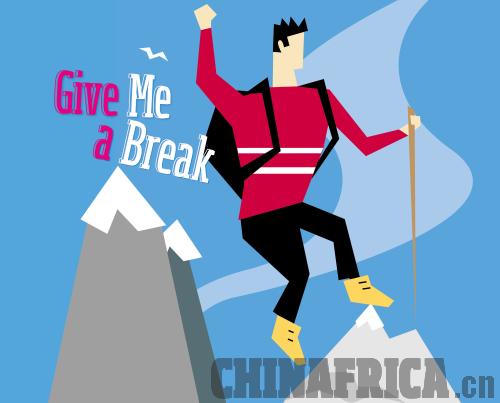|

For all the benefits of city life – diverse culture, food and people – it is a major source of stress. Crowds and noise can be oppressive, and commuting can kill you (it's more taxing than what a fighter pilot experiences in battle, according to American researchers). Is there any way to find relief? Two Beijingers think so: Jiang Qinghong, a research associate at the Chinese Academy of Social Sciences, and Natasha Pamplin-Bailey, a South African working in PR and events management, reveal how they cope with urban pressures.
Mountaineering Away Stress
by Jiang Qinghong
As a longtime Beijinger, I and other big city dwellers deal with a lot of stress. It comes from everywhere: noise, air pollution, crowded subways where people are packed together like sardines, traffic congestion, rising housing prices and consumer costs, not to mention an ever-growing rich-poor divide.
I work as a social science researcher. Living my life at a desk has left my body and mind overstrained. When I'm faced with sharp academic criticism, or when a conference is approaching but I'm still writing my paper, or when said paper is rejected, my stress spikes.
Pressure comes from external forces that go beyond an individual's normal physical and mental capacities. There are two ways to cope with it: one is to build up resistance to stress, the other is to find a way to relieve it. I do mountaineering to both combat and relieve stress.
I am fond of mountains off the beaten track. In other words, I like to have an extremely difficult climb. It gives me a sense of satisfaction after the "conquest." I can gaze down from on high, leaving the rugged paths behind. This encourages me to climb higher.
Generally speaking, the second half of a climb is a testament to the body and willpower. This period is also essential for anyone who wants to enhance their stress resistance capability. Rewards for reaching the top are many: fresh mountain breezes, distant vistas, the option to shout into any valley. It's a sense of accomplishment that causes stress to vanish.
Medical science agrees with me: research says mountaineering is an effective aerobic exercise to combat stress. Up in the mountains, it's sunny and plants release high levels of negative ions, which increase the flow of oxygen to the brain. Also, the physical activity of climbing burns calories and boosts metabolism. Statistics show that the energy consumption and metabolic rates while climbing are about 2.5 times higher than while swimming. This is especially good for city dwellers who suffer long commutes with little fresh air, and are more prone to tension, irritability, and depression. Climbing can effectively relieve these pressures, and keep the body and mind alive and refreshed.
I strongly recommend mountaineering to my fellow Beijingers, especially intellectuals. But please, never stop climbing halfway. Doing so echoes the idea of "giving up halfway," and isn't a stress reducer. Best to "reach the top and hold all mountains in a single glance."
Running and Hiking
by Natasha Pamplin-Bailey
When I first came to China, I came as a spouse (my husband had been posted to Beijing by his company). This earned me a reputation among my friends as a "lady of leisure."
Unbeknownst to them, I was commuting daily alongside 5 million other people to spend six hours a day studying Mandarin. That was three years ago. People now ask me why I walk so fast. My reply is that I can't walk slower. It's a drive to survive, albeit through my legs.
Eight years ago, I worked in London as a foreign correspondent for South Africa's biggest media group. Maybe this is where it all started. In London, no one walks slow or wastes any time. Time is money after all.
Stress was part of the daily routine. Stories would break and you had to compete with the international media. Not an easy task when the likes of CNN and BBC were sending in crews of more than 10-15 staffers to cover a story like the London Bombings back in 2005.
Now I am on what I call "Planet China." Earlier this year I landed a job at an established Chinese public relations firm. My colleagues are all Chinese and I am the company's first foreign employee. "Leisure" isn't part of my identity so much anymore.
While I'm much calmer now compared to my early days in Beijing, I'm still part of an early morning rush that inevitably ends in a stampede that leaves small-framed Chinese women crying.
You get pushed, knocked over and bruised. You get anxious, cry and get up. You dust yourself off and determinedly find your way to work.
My best stress reliever is my daily trips to the gym. This ensures the balance that I need. I feel absolutely energized after a 10-km run.
Back in South Africa, I was blessed with beautiful natural scenery, and was able to go for runs in my neighborhood. It was ideal for a relaxing and comfortable lifestyle. But running outside in Beijing is difficult because of the pollution, packed roads and overcrowded parks.
So, to escape the city stress, my husband and I usually go hiking on the weekends.
Although it takes up to 2 or 3 hours to leave the city behind, exploring China's beautiful nature is very good for our inner peace and positive karma. The pressures melt away. Even as another week of stress approaches, at least we've had our dose of unwinding. |